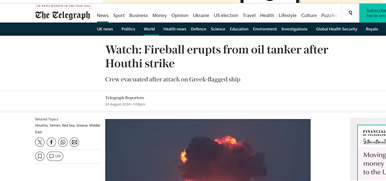In a stunning military achievement, the Yemeni Navy has dismantled the long-standing myth of U.S. naval dominance in the Red Sea. This success has disrupted the plans of the "Guardian of Prosperity" coalition, which began in December 2023 intending to secure the passage of Israeli, American, and British ships through this strategic waterway. Despite extensive efforts, including the deployment of a European arsenal by the United Kingdom, the coalition's attempts have failed miserably.
The Yemeni Navy has adopted new and innovative tactics, including the use of drones and cruise missiles, leading to a significant increase in military operations. These successes have caught the world's attention, forcing a re-evaluation of international dynamics amid ongoing conflicts. With every decisive strike, the revealing of a rising power emerging in the Bab al-Mandab Strait has become more clear, where the U.S. Navy, particularly the aircraft carrier USS Eisenhower, has been forced to withdraw from the Red Sea. Other U.S. naval forces have suffered severe damage, highlighting the superiority of the Yemeni Navy and its ability to undermine the power of the American myth and its allies
This victory is not just an ordinary triumph; but a resounding message that the course of events in the region and the world can be altered.This victory has become the talk of the hour, dominating front-page headlines in leading global newspapers and magazines, and its repercussions have drawn the keen attention of critics and analysts across various fields.
In the following lines, we will review a series of reports and articles that have covered this naval confrontation between the Yemeni forces and the U.S. naval pride, ranging from criticism to mockery. The Yemeni Navy achieved its objectives with precision, destroying several warships belonging to the "Guardian of Prosperity" coalition.
A New International Power
We begin with what was published by the British newspaper "The Telegraph" on August 24, confirming the defeat of the U.S. Navy at the hands of the Yemeni Navy, which forced it to leave the Red Sea along with all British forces, leaving no warship from the "Guardian of Prosperity" coalition in the region.
The newspaper's report, titled "Houthis Defeat U.S. Navy," explained that the U.S.-led "Guardian of Prosperity" operation was established in December 2023 in response to Yemeni naval attacks on ships linked to the Israeli enemy in the Red Sea. The goal of this operation was to provide a united international front to deter these attacks, but these efforts have been futile as the Yemeni Navy did not back down but continued its assaults.
The newspaper stated: "This led to the start of the 'Poseidon Archer' operation in January 2024, with the United States and the United Kingdom launching counter-strikes on Yemeni targets. But as Saudi Arabia proved between 2015 and 2023, and as it repeatedly told us, trying to disrupt the Yemeni Navy with kinetic airstrikes is like punching smoke, and this has been proven."
The report added: "These efforts have yielded no progress, even when the European Union formed a splinter coalition named 'Aspid,' avoiding association with the American position on Israel. The West's inability to agree on how to perform a relatively simple task did not go unnoticed by its potential adversaries, and shipping companies we were trying to reassure certainly took note."
According to the report, "Since January, not only have the attacks increased steadily in number, but they have also diversified. Drones and cruise missiles have been accompanied by hijackings and ballistic missiles. April saw the first use of an unmanned surface vehicle, and this method has seen a steady increase since then."
The report also noted that "recently, the Yemeni Navy has begun following up their attacks with small arms fire from fast boats, and the past few weeks have seen an increase in the number of attacks beyond the previous average of 2.5 attacks per week."

The Red Sea Without U.S. Presence
The Telegraph pointed out that "the Greek-flagged oil tanker 'Sounion' was the latest victim, attacked four times on Wednesday, leading to a fire on board. A French warship from the EU's 'Aspid' mission came to assist its crew, intercepted an approaching drone before rescuing the crew and transporting them to Djibouti."
The report considered that "the fact that an EU ship came to the rescue is not surprising; despite the EU's limited naval resources, it is the only one currently present, with no 'Guardian of Prosperity' coalition ship within 500 miles." This underscores the U.S. inability to counter Yemeni missiles after Washington was forced to retreat this far.
The newspaper also highlighted examples of U.S. failures in the Red Sea, noting that "last May, when the USS Dwight D. Eisenhower was present, the United States had 12 warships in the region providing a mix of missile monitoring and escort missions. Now, it has none, and briefly, the United Kingdom had three ships, with HMS Diamond performing some outstanding work as part of the 'Guardian of Prosperity' group, but when the group left, we left."
Justifying the Defeat
The report justified the British withdrawal from the Red Sea, stating that "from the United Kingdom's perspective, the reason is clear and straightforward: we don't have enough ships, or more precisely, we don't have enough of them in operational condition. As for the United States, it's more complicated because they have the ships, but they chose not to send any." However, early coalition statements declared their readiness and possession of the necessary capabilities to stop Yemeni military operations.
The report added: "This does not mean that the Americans are not facing their own problems. The U.S. Navy announced that it might have to retire 17 support ships due to crew-related issues. Additionally, the Western Pacific is without aircraft carriers for the first time in years. Ironically, two of these carriers are in the Middle East, but not in the Red Sea. Moreover, the latest U.S. frigate-building program is collapsing, and the rate of building Virginia-class submarines is below what is needed to maintain the current fleet. Now, the U.S. Coast Guard has no operational icebreakers."
The newspaper concluded its report with several conclusions, including that "we can only reach one conclusion: the United States has abandoned the 'Guardian of Prosperity' operation. It failed to deter the Yemeni Navy and reassure maritime shipping, so it might be better for it to go and do something else."
The report considered that "navigating around the Cape of Good Hope is the new normal for now."
The report also noted that "simply giving up while seeking a political or financial solution represents a significant departure from the historical thinking of U.S. naval deterrence."
New Tactics
On the same topic, the American maritime publication "Maritime Executive" reported on August 24 a qualitative shift in the Yemeni military's strategy, noting that there has been a clear change in the Yemeni Navy's strategy in targeting ships.
The publication explained that on August 21 and 22, the Yemeni Navy pursued a single bulk carrier for hours, launching several unsuccessful attacks on the ship.
It added that in the early stages of their campaign, they usually attacked a ship and then moved on to their next target. However, recently, they have started attacking the same ship multiple times using a range of diverse methods and tactics. For example, we saw this with the three attacks on crude oil tankers operated by Delta Tankers before successfully disabling one of the ships in their fourth apparent attempt. Nevertheless, they targeted the same tanker again the next day in an attack thwarted by a French frigate.
Target No. 111
The Yemeni Armed Forces continue to implement new strategies involving targeting ships that violate the imposed ban. Reports indicate that these operations reflect Yemen's ability to shift the balance of power in the maritime region, raising concerns among Western powers.
The target last Thursday was a dry cargo ship recently acquired by a group called "Sea World Management." The Greek-owned company mentioned on its website that it has been operating for over 30 years and manages a fleet of over 30 ships from its offices in Monaco.
This is not the first time the same company has been targeted, according to the site. The company also managed the product tanker "Bentley 1," which was targeted in July. The Yemeni Navy launched several attacks using "drone boats, drones, and ballistic missiles," but the ship survived unharmed.
The ship targeted last Thursday is now operating under the name "SW North Wind 1" (55,989 tons deadweight). Built-in 2009, it was previously operated by Eagle Bulk and briefly transferred to Star Bulk during a merger before being handed over to its new owners in June 2024. The ship is registered in Panama and began its current voyage from Korea at the end of July, stopping in Singapore and heading towards the Suez Canal, although it has stopped transmitting AIS signals for several days.
The British Maritime Trade Operations (UKMTO) received the first report of an attack while the ship was 57 nautical miles south of Aden, Yemen. The ship's captain reported two explosions in the water nearby. In the following hours, according to maritime security advisories and UKMTO, three more explosions occurred. Once again, the ship sustained no damage and continued its course northward.
The ship passed through Bab al-Mandab, and UKMTO reported that while it was west of Hodeidah, another explosion occurred. This latest attempt involved an unmanned bomb boat. UKMTO believes it exploded before reaching the ship, while Vanguard reports that it touched the ship but caused no significant damage.
This incident is the 111th recorded by UKMTO in 2024. They continue to advise all ships to exercise caution, as the Yemeni Navy appears to be targeting ships traveling towards the Suez Canal, which may mean that most ships still passing through the canal will be involved in an incident sooner or later.
Surprise Weapon
Finally, the American "Defense News" magazine published a lengthy report yesterday, emphasizing that the Yemeni forces have revealed a surprise weapon in their confrontation with the "Guardian of Prosperity" coalition. This weapon will mark a turning point in the conflict.
The report stated that "the surprise is not related to the type of weapon, but rather to the method of its use, which has baffled military analysts and researchers worldwide. The Yemeni forces have effectively employed the sea mines they produced to target enemy ships."
The report added, "These sea mines are deployed in strategic locations in the Red Sea, where enemy ships pass. These mines have been highly effective in targeting warships and transport ships, as was the case with the Israeli enemy's 'Hanit' ship, which was hit last week."
The report concluded that "the Yemeni forces are adopting new tactics to confront the coalition forces, combining traditional weapons with innovative strategies that have yielded impressive results." The Yemeni success on the battlefield has made it clear that the balance of power in the Red Sea has shifted in favor of the Yemeni Navy, which now poses a significant threat to international shipping."
The report also pointed out that "the Yemeni success in using these sea mines indicates the growing military capabilities of the Yemeni forces, which have become an influential player in the region, capable of challenging the largest military forces in the world."
The High Cost of U.S. Strategy in the Red Sea
In a recent analysis, the American magazine *National Interest* highlights the escalating challenges faced by the United States in the Red Sea, particularly in light of the increasing Yemeni attacks on vessels in the region. Despite ongoing efforts to protect their shipping, the intensifying Yemeni threat has exerted tremendous pressure on the United States, significantly undermining its prestige and presence in the Red Sea.
According to the magazine, Washington is grappling with a worsening crisis due to the continuous use of drones and missiles by Yemeni forces to disrupt maritime traffic linked to Israel or affiliated with the U.S. and the U.K. This ongoing threat is not only weakening America's ability to protect its interests in the region but is also draining its military resources.
Security advisor Samuel Byers emphasized that the U.S. strategy in the Red Sea is facing massive challenges due to the persistent escalation by Yemeni forces. The U.S. has been forced to bear an exorbitant cost in strategic resources as it pursues the forces of Sana’a, which have now become a direct threat to Washington's interests in the area.
Byers noted that the United States has deployed four consecutive aircraft carrier groups, including the USS Abraham Lincoln, to protect international shipping in the Red Sea, but these efforts have not yielded any tangible results. On the contrary, the presence of these forces has become a significant strategic burden on the U.S. Navy, with the Pentagon compelled to allocate one-third of its aircraft carrier power just to monitor the situation in the Red Sea.
The report points out that the Biden administration finds itself forced to deploy additional aircraft carriers in the region, such as the USS Abraham Lincoln, to safeguard the ships that have been banned from passage.
Despite these efforts, the Yemeni threat has not abated; instead, it has escalated, putting enormous pressure on the United States. This escalation has led to a 50% reduction in traffic through the Red Sea, resulting in substantial financial losses for the Western powers supporting Israel.
The report highlights that the current U.S. strategy appears ineffective, relying solely on deterrence and defense without addressing the root causes of the crisis, which the magazine claims include "Iran's support for the Houthis." Rather than taking decisive steps to halt the Yemeni forces' threats, Washington has found itself forced to continue dedicating a significant portion of its naval power—equivalent to one-third of its aircraft carrier strength—to protect its dominance in global trade routes, weakening its ability to face larger challenges such as China.
These developments signal a fundamental shift in the balance of power in the region, as Yemeni forces have succeeded in compelling the United States to redirect a substantial part of its resources to protect its maritime interests, thereby bolstering Yemeni influence in the Red Sea and weakening U.S. control over vital maritime passages.
These shifts may lead the United States to reconsider its strategy and confront the reality that the Yemeni threat has become a formidable force in the region's power dynamics.
No Prosperity, No Guard
When the United States becomes the object of ridicule among activists, it is further evidence of American weakness and the intractable predicament with no apparent solution, after decades of being seen as a symbol of military power and advanced technology.
In this context, some within American circles have expressed sarcasm regarding the U.S. coalition in the Red Sea, dubbed "Guardian of Prosperity." Bill Roggio, a researcher at the Foundation for Defense of Democracies, tweeted in response to the situation: "No prosperity and no guard," pointing to the failure of U.S.-Western alliances in achieving their goals against the escalating threat posed by Yemeni forces.
In a sarcastic critique, a researcher at the Foundation for Defense of Democracies (a pro-Israel American lobbying group) criticized the U.S. coalition "Guardian of Prosperity" after the Yemeni army aired footage of the Greek ship "Sounion" burning in the Red Sea.
Bill Roggio shared the footage broadcast by Yemeni military media in a post on X, commenting: "No prosperity and no guard."
He added in another post: "It would have been better for the United States to do nothing rather than to show its complete failure, lack of will, and incompetence."
The footage aired by the Yemeni military media showed large explosions and intense fires aboard the Greek ship, which Sana’a forces claimed was operated by a company dealing with Israel and violating the ban on access to Israeli ports.
In conclusion, the developments in the Red Sea stand as evidence of a fundamental shift in the balance of power, with far-reaching implications for the strategic situation in the region.








